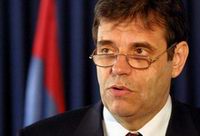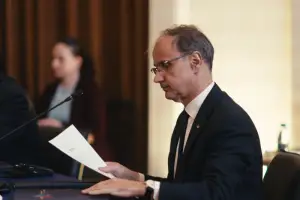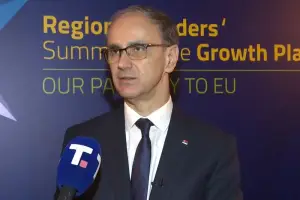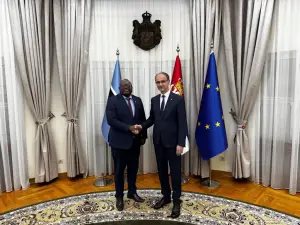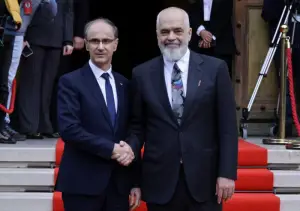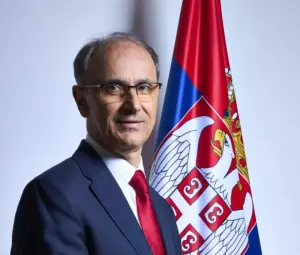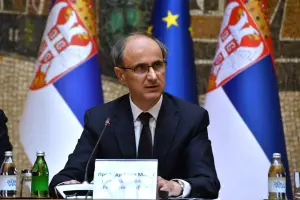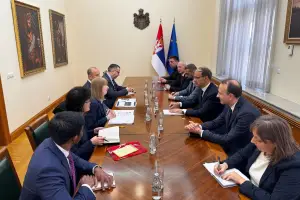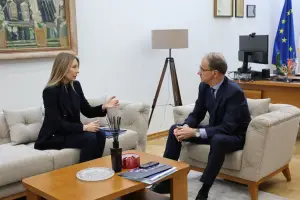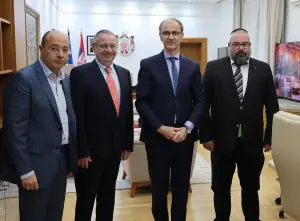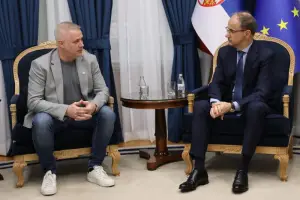Q:
A:
Kosovo-Metohija witnesses drastic examples of religious intolerance
Belgrade / Thessaloniki,
21 October 2004
Addressing an intereligious dialogue themed "Europe through Reconciliation and Cooperation" in Thessaloniki today, Prime Minister Vojislav Kostunica said that he is certain that no person cherishing European values and democratic standards can overlook the fact that Serbs and other non-Albanians in Kosovo-Metohija are deprived of basic freedoms and rights because the province is located in the very heart of democratic Europe.
The following is the Prime Minister's address in full:
Ladies and Gentlemen,
Today, in the era of multifaceted ties between nations and states, with Europe beginning to exemplify integration and unity, we have to think about the importance and presence of spiritual and cultural dimension in mutual understanding. In such deliberations, religion appears to be an unavoidable concern. Not only because religion has been intrinsically linked with mankind through time and space of its existence, but also for a very particular meaning it has given to the life of Man, in the ancient and modern history alike.
Allow me now to give you a brief account of Serbia's present-day religious structure. Surprisingly enough, in a country where atheism had been tantamount to a state religion for decades, the 2002 census showed that 95 percent of the population felt affiliated with a church or a religious community. A mere 0.53 percent defined themselves as atheists, while another 4.5 percent remained undecided or failed to identify clearly their confessional affiliation.
The census also unveiled a multireligious Serbia, with the Serbian Orthodox Church prevailing in terms of numbers. It has been allowed unrestricted activity, together with the Roman Catholic Church, old Protestant churches, the Lutheran and Calvinist churches, and a string of Evangelistic communities that emerged in Europe and America in the 19th and 20th centuries. The Islamic community was established in Serbia in the 14th century, while the Jewish community has been active since the 16th century.
In terms of religion, Serbia is an entirely open state. The multitude of churches can bind us with many nations, nearly all European peoples. Serbia's religious composition in itself makes it a state already integrated into Europe and the world.
I would like to note that the existing religious structure of Serbia might be its big chance. In order to use it, however, Serbia needs to make a concerted spiritual, cultural and political effort. Spiritually, Serbia has made an unspoken yet deep and effective, intellectual, moral and existential effort to overcome and shed a new spiritual light on the traumatic experiences in the recent and not-so-recent history and a heavy historic legacy it has to shoulder. The Christian churches, as well as all other religious communities in Serbia, share the knowledge that the historic experiences and cultures of ethnic groups have been largely antagonised, with deep-rooted mutual distrust between them. The churches and confessional communities cannot automatically abandon or forget the traditions that have survived in the historic memory and cultural awareness of the people. But it is very important that they want and strive to shed a spiritual light on the negative historic experience, to understand and overcome it. Clearly, antagonisms, intolerance and confrontation between nations and religions are incompatible with religious teachings.
Unfortunately, Kosovo and Metohija has seen drastic examples of religious intolerance - churches, monasteries and holy objects were destroyed, people were persecuted and killed on religious or ethnic grounds. I am convinced that anyone who has embraced European values and democratic standards cannot accept the fact that Serbs and non-Albanians in Kosovo are deprived of basic freedoms and rights, first of all, of right to live a free and safe life, freedom of movement, survival, return and freedom of religion. Such a situation is entirely unacceptable - Kosovo and Metohija is at the heart of a democratic Europe, which we see as a free home that we share, a home that should rest on solid democratic fundaments and indisputable, universal moral values.
A free dialogue between all religious communities had been developed in Serbia today. This dialogue, very precious to our society, makes it possible for them to exchange different experiences with full respect. I do believe that the dialogue between religious communities in Serbia have already produced useful results. Through this dialogue, going hand in hand with cooperation between the state, the churches and the religious communities, we advocate such a social environment that would block any attempt at political instrumentalisation of religious feelings. The dialogue between religious communities on the one hand, and with state institutions on the other, may open a new chapter in relations between the nations of the region, and facilitate understanding and reconciliation of the nations who used to live in one state, but had battle lines drawn until recently.
Ladies and Gentlemen,
Today, in the era of multifaceted ties between nations and states, with Europe beginning to exemplify integration and unity, we have to think about the importance and presence of spiritual and cultural dimension in mutual understanding. In such deliberations, religion appears to be an unavoidable concern. Not only because religion has been intrinsically linked with mankind through time and space of its existence, but also for a very particular meaning it has given to the life of Man, in the ancient and modern history alike.
Allow me now to give you a brief account of Serbia's present-day religious structure. Surprisingly enough, in a country where atheism had been tantamount to a state religion for decades, the 2002 census showed that 95 percent of the population felt affiliated with a church or a religious community. A mere 0.53 percent defined themselves as atheists, while another 4.5 percent remained undecided or failed to identify clearly their confessional affiliation.
The census also unveiled a multireligious Serbia, with the Serbian Orthodox Church prevailing in terms of numbers. It has been allowed unrestricted activity, together with the Roman Catholic Church, old Protestant churches, the Lutheran and Calvinist churches, and a string of Evangelistic communities that emerged in Europe and America in the 19th and 20th centuries. The Islamic community was established in Serbia in the 14th century, while the Jewish community has been active since the 16th century.
In terms of religion, Serbia is an entirely open state. The multitude of churches can bind us with many nations, nearly all European peoples. Serbia's religious composition in itself makes it a state already integrated into Europe and the world.
I would like to note that the existing religious structure of Serbia might be its big chance. In order to use it, however, Serbia needs to make a concerted spiritual, cultural and political effort. Spiritually, Serbia has made an unspoken yet deep and effective, intellectual, moral and existential effort to overcome and shed a new spiritual light on the traumatic experiences in the recent and not-so-recent history and a heavy historic legacy it has to shoulder. The Christian churches, as well as all other religious communities in Serbia, share the knowledge that the historic experiences and cultures of ethnic groups have been largely antagonised, with deep-rooted mutual distrust between them. The churches and confessional communities cannot automatically abandon or forget the traditions that have survived in the historic memory and cultural awareness of the people. But it is very important that they want and strive to shed a spiritual light on the negative historic experience, to understand and overcome it. Clearly, antagonisms, intolerance and confrontation between nations and religions are incompatible with religious teachings.
Unfortunately, Kosovo and Metohija has seen drastic examples of religious intolerance - churches, monasteries and holy objects were destroyed, people were persecuted and killed on religious or ethnic grounds. I am convinced that anyone who has embraced European values and democratic standards cannot accept the fact that Serbs and non-Albanians in Kosovo are deprived of basic freedoms and rights, first of all, of right to live a free and safe life, freedom of movement, survival, return and freedom of religion. Such a situation is entirely unacceptable - Kosovo and Metohija is at the heart of a democratic Europe, which we see as a free home that we share, a home that should rest on solid democratic fundaments and indisputable, universal moral values.
A free dialogue between all religious communities had been developed in Serbia today. This dialogue, very precious to our society, makes it possible for them to exchange different experiences with full respect. I do believe that the dialogue between religious communities in Serbia have already produced useful results. Through this dialogue, going hand in hand with cooperation between the state, the churches and the religious communities, we advocate such a social environment that would block any attempt at political instrumentalisation of religious feelings. The dialogue between religious communities on the one hand, and with state institutions on the other, may open a new chapter in relations between the nations of the region, and facilitate understanding and reconciliation of the nations who used to live in one state, but had battle lines drawn until recently.

